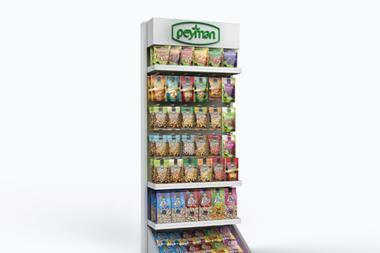Symington’s has just expanded again – this time into wet sauces. What has the company done to bring about its impressive growth since 2007, asks Hannah Stodell
With dry food expertise dating back to the 19th century, Symington’s latest acquisitions - of Unilever’s wet sauce brands Chicken Tonight and Ragu - appear to signal a marked shift in strategy.
The deal is expected to take Symington’s annualised gross sales to £150m more than triple that posted at the time of its 2007 Hermes Private Equity-backed management buy-in.
So what has fuelled the growth of the business since the new owners came on board and what’s next for the Leeds company?
Aside from the acquisition of Hain Celestial’s dry mix operation in November 2007, the years following Symington’s sale to David Salkeld and Henrik Pade are largely punctuated by a string of key licensing deals, including tie-ups with celebrity chef brands Ainsley Harriott and James Martin, as well as Aunt Bessie’s and Campbell’s soups.
Chief executive Salkeld attributes 95% of Symington’s revenues since the 2007 buy-in to NPD for such brands. “About £20m has been acquisition revenues and the rest is NPD,” he says, adding that 282 new and 244 refreshed products have launched in the past year. “We have a big engine room of NPD in terms of brands and people. A business like ours would normally have five or six people in NPD we have 15.”
Salkeld has sought to build a business through “an NPD lens rather than a synergy lens” a strategy that, he says, also applies to Chicken Tonight and Ragu. He doubled the size of Symington’s kitchen in the first six months and set about doubling the NPD team. And with its NPD needs in mind, Symington’s has spent £15m since 2007 to increase capacity, improve efficiency and support the brands.
Salkeld’s knack for revitalising tired and unloved brands has also had a key part to play, according to industry sources. “He’s a quick decision maker, he’s well connected and not uncomfortable about using those connections,” says one source. “A lot of businesses talk about doing licences and get bogged down in red tape and lawyers, but he just gets on with it.”
However, while turnover has grown sharply, the significant NPD, extended workforce and new factory equipment have all dragged on the bottom line, according to industry insiders. “David is extremely good at developing new products, entering into new licensing arrangements and growing the top line very strongly,” says an ex-colleague. “I would just question if that growth in sales is being mirrored by growth in profitability.”
Symington’s acknowledges that profitability hasn’t increased at the same rate as sales, but says it has continued to grow year-on-year since the management buy-in. “We’ve seen a significant improvement over that time period,” says financial director John Kitson. “EBITDA will have doubled by February 2012 versus the level posted immediately prior to the MBI.” This growth, he says, has helped support manufacturing investment and the new brands and licences acquired over the years.
With a cupboard full of dried brand licensing agreements, experts suggest the company’s pounce on Ragu and Chicken Tonight could signal an exit strategy for Salkeld, who has a “significant” personal stake in the business. “David is on the fast track to try and find an exit and is pushing hard to grow the top line very quickly and get the business in the right shape to sell,” says an M&A source. “I’d be very surprised if that business didn’t come to market within the next 18 months.”
Salkeld acknowledges the clock may be ticking for owner Bridgepoint, the private equity firm that t0ok over management of Hermes Private Equity in 2009, but bats off the suggestion of a personal exit. “We think we can go on another five to 10 years and build a much bigger business, maybe with a new investment partner and new banking construct,” he says. “We’re not on a fast track for a personal exit we’re on a long-term path to great shareholder value.”
He points to the January deal with Campbell’s to bring the soup brand back to the UK as a precursor for Symington’s extension into wet foods a new focus in the next few years. “I don’t see the deal as a dramatic category shift as some people might,” Salkeld says. “We’re targeting the same occasion. It just happens to be wet.”
Sign in to comment on this article
Not logged in before? Register for FREE guest access today.
You will be able to:
- Read more stories
- Receive daily newsletters
- Comment on stories
Advert



















No comments yet